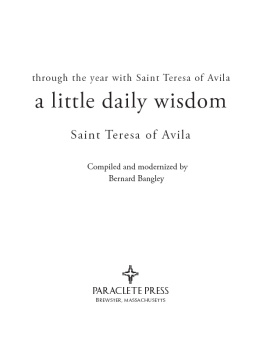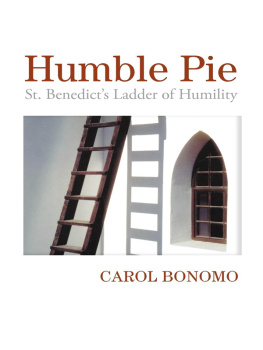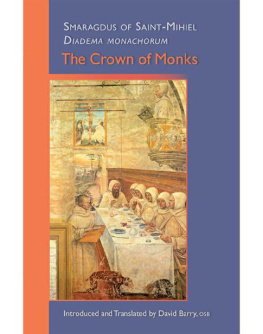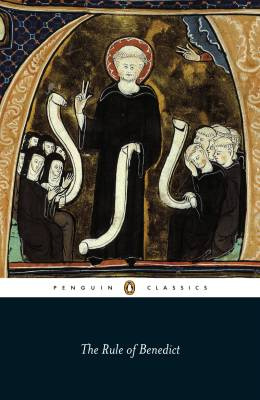The wisdom of St. Bernard has found an outstanding new voice in the meditations contained in this book. The authors wonderfully personal style transforms the reader from a mere listener to an active participant in a grace-filled dialogue. The experience of monastic life appears here in all of its beauty, simplicity, and truth.
Fr. Maximos of Simonopetra (Mt. Athos)
Long ago St. Francis espoused Lady Poverty and in our own time Bernard Bonowitz, OCSO, has taken to himself Lady Truth. The happy fruit of this union is a commentary that conveys St. Bernards meaning in a way that brings us in touch with the original depth, incisiveness and humor of this great work. We are deeply indebted to Bernard Bonowitz for making this possible by his own honesty, humor and depth.
Mother Maureen McCabe, OCSOMount Saint Marys Abbey, Wrentham, MassachusettsAuthor of I Am the Way: Stages of Prayer in Saint Bernard
Dom Bernard offers an analysis so clear and compelling that this book will become a spiritual source book for all who read it. There is a depth of personal experience and conviction in the book that is captivating. With sweeping references to literature, philosophy, and theology, Dom Bernard demonstrates a breadth and depth of appreciation for the spirituality of Bernard of Clairvaux that balances scholarship with spiritual direction.
Fr. James McCloskey, CSSpDuquesne University
This book has much to recommend it, especially as a reliable interpretation of the Saints teaching. In a particular way, it will help us to discover how the doctrine of the Abbot of Clairvaux is present and active in our own monastic life as we live it in the here and now. The examples taken from the authors personal experience give a special zest to the solid teaching the book contains, all of which contributes to the depth and relevance of its message and the attractiveness of its general style.
Abbot Bernardo Olivera, OCSOAbbey of Nuestra Seora de los ngeles (Argentina)Author of The Sun at Midnight: Monastic Experience of the Christian Mystery
MONASTIC WISDOM SERIES
Simeon Leiva, OCSO, General Editor
Advisory Board
Michael Casey, OCSO | Terrence Kardong, OSB |
Lawrence S. Cunningham | Kathleen Norris |
Patrick Hart, OCSO | Miriam Pollard, OCSO |
Robert Heller | Bonnie Thurston |
MONASTIC WISDOM SERIES: NUMBER THIRTY-NINE
Saint Bernards
Three-Course Banquet
Humility, Charity, and
Contemplation
in the De Gradibus
By
Bernard Bonowitz, OCSO

Cistercian Publications
www.cistercianpublications.org
LITURGICAL PRESS
Collegeville, Minnesota
www.litpress.org
A Cistercian Publications title published by Liturgical Press
Cistercian Publications
Editorial Offices
Abbey of Gethsemani
3642 Monks Road
Trappist, Kentucky 40051
www.cistercianpublications.org
Scripture texts in this work are from the Revised Standard Version of the Bible, Copyright 1952 [2nd edition, 1971] by the Division of Christian Education of the National Council of the Churches of Christ in the United States of America. Used by permission. All rights reserved.
2013 by Order of Saint Benedict, Collegeville, Minnesota. All rights reserved. No part of this book may be reproduced in any form, by print, microfilm, microfiche, mechanical recording, photocopying, translation, or by any other means, known or yet unknown, for any purpose except brief quotations in reviews, without the previous written permission of Liturgical Press, Saint Johns Abbey, PO Box 7500, Collegeville, Minnesota 56321-7500. Printed in the United States of America.
The Library of Congress has cataloged the printed edition as follows:
Library of Congress Cataloging-in-Publication Data
Bonowitz, Bernard.
Saint Bernards three-course banquet : humility, charity, and contemplation in the De gradibus / by Bernard Bonowitz. p. cm. (Monastic wisdom series ; no. 39) ISBN 978-0-87907-039-7 ISBN 978-0-87907-767-9 (ebook) 1. Bernard, of Clairvaux, Saint, 1090 or 91-1153. De gradibus humilitatis et superbiae. 2. HumilityReligious aspectsChristianityEarly works to 1800. 3. Pride and vanityEarly works to 1800. 4. God (Christianity)Worship and loveEarly works to 1800. I. Title.
BV4647.H8B63 2013
241.4dc23 | 2012035561 |
For my five beloved sisters:
Rochelle, Marie-Genevive,
Susan, Joan and Maureen
Contents
Editors Foreword
Saint Bernards justly famous work, The Steps of Humility and Pride (Latin: De gradibus humilitatis et superbi ) is a short book consisting of a mere fifty-seven paragraphs. Even though it is the first published work of the great Cistercian abbot, and therefore a product of his youthful creativity, it nevertheless presents a challenge to the modern reader because of its tight rhetorical structure and the pithiness of its doctrine. Most contemporary readers, even those avidly desiring solid spiritual nourishment, will normally need to be initiated gradually into twelfth-century Cistercian literature. Such a fruitful twenty-first-century initiator would be one who could open up and restate Bernards concerns in modern idiom and image, but without diluting them. That ideal person would also be an articulate disciple of Jesus who both understands the ancient Cistercian heritage intellectually and also has had long experience in personally trying to live out its truths in the interior dimension.
In my opinion, one could hardly hope for a better guide for such initiation than Bernard Bonowitz, OCSO. A convert from Judaism with a degree in classics from Columbia University, Dom Bernard was a Jesuit for nine years before entering St. Josephs Abbey in Spencer, Massachusetts. Immediately upon professing vows, his abbot named him master of novices, a position he held for ten years and that gave him ample opportunity to share considerable gifts of mind and heart while initiating newcomers into monastic life, at the levels of both classroom teaching and spiritual direction. In 1996 he was elected superior of the monastery of Novo Mundo in Brazil, which within a very few years he shepherded into a true monastic springtime. In 2008 he became abbot of Novo Mundo, now a community attracting an impressive number of young men anxious to follow the way of Cistercian discipleship.
If this book by Dom Bernard mediates to us moderns the deep meaning and lived experience of Saint Bernards treatise, the reader should know that the abbot of Clairvaux was himself unpacking for his twelfth-century audience the doctrine of the very crucial chapter 7 of Saint Benedicts sixth-century Rule for Monks, which fixes at twelve the number of dynamic steps or degrees for both humility and pride. In this chapter, which could be considered the spiritual basis of all Benedictine existence, the great monastic legislator writes in a paradoxical and even humorous mode: If we want to reach the highest summit of humility, if we desire to attain speedily that exaltation in heaven to which we climb by the humility of this present life, then by our ascending actions we must set up that ladder on which Jacob in a dream saw angels descending and ascending (Gen 28:12). Without doubt, this descent and ascent can signify only that we descend by exaltation and ascend by humility.
In other words, progress toward God by the way of humility stands our world, as constructed by selfish interests and drives, totally on its head. This new topsy-turvy mode of existence so unsettles our lust for dominance and earthly success that at last we may begin to realize that what has seemed a triumphal way up is really a dark way down and that what feels like a downward plunging into failure and loss of self is really the royal road up to the embrace of the humble and glorious Christ. Only then may God begin to transform us interiorly according to his own truth and love, in the image and likeness of his beloved Son. By making our own the doctrine of both Saint Bernard and Saint Benedict, as made here accessible to us by Bernard Bonowitz, we can be sure we will be drinking at the purest sources of the monastic tradition, which at that depth becomes one with the Gospel itself.
Next page












